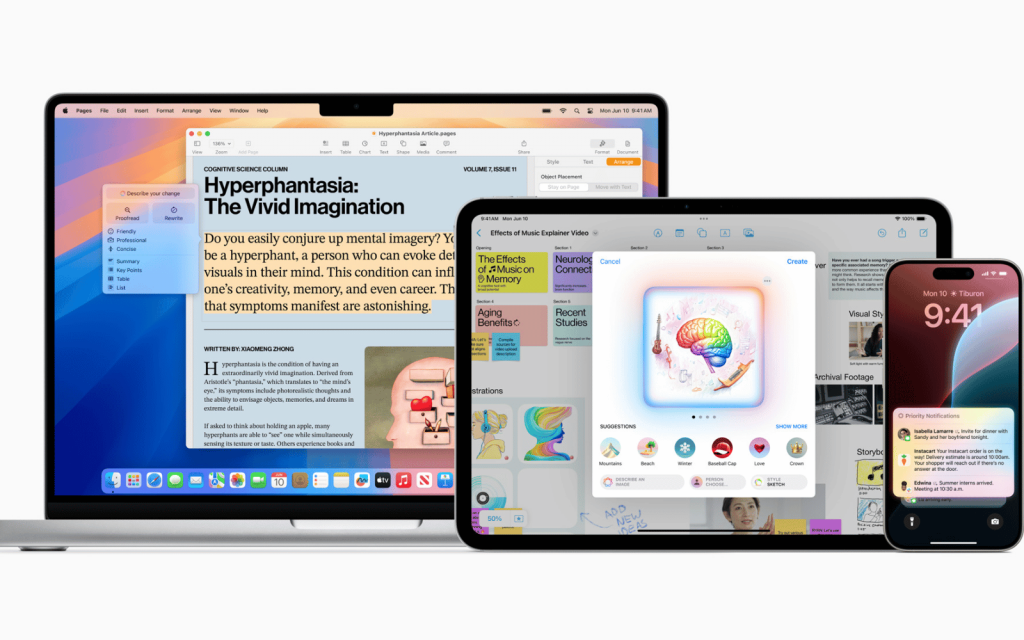If you’re interested in tech, you’ll probably already know that Apple announced what it calls ‘Apple Intelligence’ during the keynote for its annual worldwide developers conference last night. If you aren’t interested in tech, here are some cute animals. Enjoy.
Apple crammed all the incoming updates to its iPhones, iPads, watches, and MacBooks into the first hour of last night’s keynote, we have a separate article for those. It scarcely mentioned AI at all. We thought we might even be spared from anything AI-related… how naive.
Oh, that’s what AI stands for
Apple made some lofty claims about Apple Intelligence, saying it sets “a new standard for privacy in AI” right before admitting it will use every piece of info Apple has on you to “deliver intelligence that is helpful and relevant” to your personal context.
Real-world applications for Apple Intelligence include familiar AI-powered features like summarising or rewriting text and generating images, managing notifications, or carrying out actions between apps all while drawing from your “personal context”. We immediately wondered if this would be limited to only Apple’s apps but, with this being a developer’s conference, Apple quickly noted developers could use its App Intents API in third-party apps too.
Apple’s systemwide writing and image generation tools will be available across iPhones, iPads, and MacBooks pretty much everywhere you would need them — Mail, Notes, Pages, etc. Summarise long emails, proofread and change the tone of your text, and add AI-generated images to your notes based on what you’ve written down.
Apple Intelligence will also help manage your notifications. It will list the most important alerts first or move them to the top of your stack while also providing a summary of each notification for you to check at a glance. If you don’t want to be disturbed, the ‘Reduce Interruptions’ feature will silence all but the most pressing notifications.
Siri gains Apple Intelligence
A big part of Apple’s new AI feature set is a cross-platform upgrade to Siri. The mostly-forgotten voice assistant is back with deeper integration into Apple’s operating systems.
“With richer language-understanding capabilities, Siri is more natural, more contextually relevant, and more personal, with the ability to simplify and accelerate everyday tasks,” says Apple.
It can retain context over multiple requests and is now ‘aware’ of what’s on your screen and can take actions based on what it ‘sees’ or the context you provide, either through voice or typed communication.
Read More: Hold onto your hats, iOS 18 lets you put apps anywhere (and other stuff, too)
When Siri can’t provide what you’re looking for, it will turn to ChatGPT-4o for those requests. Not without your permission though. Apple says Siri will ask you before sending requests, questions, documents, or photos. So at least there’s that.
The Fruit Company is allowing the use of ChatGPT in its writing and image generation tools without the need to create and pay for an account but ChatGPT subscribers will also be able to connect their OpenAI accounts to access paid-for features. ChatGPT will be the first third-party AI-powered chatbot but it won’t be the only one, Apple plans to add support for other models in the future.
“A new standard for privacy in AI”

If you thought Microsoft’s Recall, a feature that aims to create a searchable history of everything you’ve done on your PC, seemed too dystopian, we wonder how you feel about Apple Intelligence.
In order for AI assistants to work the way they do in movies, they need access to everything. Every piece of information about you like where you work, where you live, who you speak to, where you go, and what you do adds important context so you can make tangential requests without first having to define everything. But society is still largely distrustful of big companies and their AI offerings. Not only because of what they might do with your data but also how securely they store it.
Apple is obviously aware of this, so to quell fears it says many of the models powering Apple Intelligence will run on-device and mentions that “it is aware of your personal data without collecting your personal data.” When greater AI processing power is needed, Apple will use what it calls ‘Private Cloud Compute’ which is basically Apple-powered cloud servers.
According to Apple, these extend “the privacy and security of Apple devices into the cloud” by only sending the relevant personal data to fulfil your request, never storing your data, and allowing “independent experts” to verify Apple’s privacy promise.
